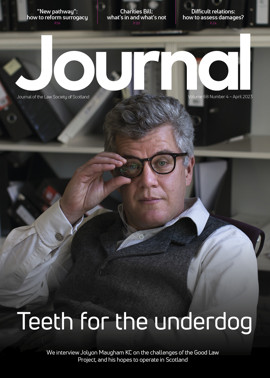Public policy highlights: April 2023
The Society’s policy committees analyse and respond to proposed changes in the law. Key areas from the last few weeks are highlighted below.
Illegal Migration Bill
The Immigration & Asylum Committee issued a briefing on the bill in advance of the House of Commons second reading. It raised concerns that the UK Government is pressing ahead with legislation which may not be compatible with the European Convention on Human Rights, potentially contravening UK law and the 1951 UN Refugee Convention.
Introducing the bill, Home Secretary Suella Braverman said she was unable to state that its provisions were compatible with the Convention rights, but the UK Government still wished the bill to proceed.
The committee also expressed concern that very little time was allowed for the bill to be reviewed in its entirety and for the proper checks and balances which are an important part of the parliamentary process.
Read more at the Society’s page on the bill.
Trusts and Succession Bill
The Society submitted written evidence on the Trusts and Succession (Scotland) Bill to the Scottish Parliament’s Delegated Powers & Law Reform Committee. It welcomed the bill and the opportunity it presents to reform and consolidate trust law. It highlighted a number of areas where the Society considered the bill could be refined and improved. Specific comments related to duties to provide information, trustee’s duty of care, expenses of litigation and certain definitions in part 3 of the bill.
It also highlighted that the bill raises considerations regarding the interaction between trust law and charity law in the context of public trusts, which may be registered charities. In particular, it called for clarification on whether certain provisions are intended to apply to public trusts, with amendment of the definition of “beneficiary” to remove uncertainty in relation to public trusts. It further called for the proposed abolition of restrictions on accumulation of income to be extended to charitable trusts.
On the proposals relating to succession, the written evidence pointed to the potential for inconsistency under both the current law and the bill, and called for change to be considered extremely carefully. Widespread public education should accompany any changes to the law in this area.
The Society expressed regret that the bill does not legislate for the nature and constitution of trusts: further consideration should be given to these matters at a future date.
Read more at the Society’s page on the bill.
Moveable Transactions Bill
The Society issued several amendments to the Moveable Transactions (Scotland) Bill ahead of its stage 2. These seek to provide clarity on relevant sections and consistency with wider insolvency legislation.
The bill seeks to modernise and reform Scots law in relation to security over and assignation of moveable property, and to remove the need for intimation to the debtor when assigning a claim, assignations being registered in the Register of Assignations. It would also create a new form of security over moveable property called the statutory pledge, and a Register of Statutory Pledges, removing the need for physical delivery to the creditor.
Read more at the Society’s page on the bill.
Economic Crime etc Bill
The Society issued a briefing on the Economic Crime and Corporate Transparency Bill ahead of the House of Lords committee stage. The bill seeks to complement the Economic Crime (Transparency and Enforcement) Act 2022, and to address the use of UK corporate structures for purposes of economic crime, by reforming Companies House, improving its functionalities and the accuracy of companies data, and the law on limited partnerships, amending the powers of the Registrar of Companies.
It would also provide law enforcement with new powers to seize cryptoassets, and enable businesses in the financial sector to share information for the prevention and detection of crime.
The briefing commented on the position of Scottish limited partnerships, noting that they are a popular vehicle in investment, such as operating funds or holding commercial property. The Society is keen to support the Government in ensuring that limited partnerships are not open to abuse by those engaged in criminal activity.
The Society also commented that there should be a consistent approach to anti-money laundering supervision in the UK.
Read more at the Society’s page on the bill.
For more information see the research and policy section of the Society’s website.
Perspectives
Features
Briefings
- Criminal court: Towards proper control
- Planning: NPF4 – an emerging housing issue
- Insolvency: Court confirms overseas winding up approach
- Tax: R&D relief – welcome changes but outlook uncertain
- Immigration: Family reunions given new rules
- Scottish Solicitors' Discipline Tribunal
- In-house: Support to suit






